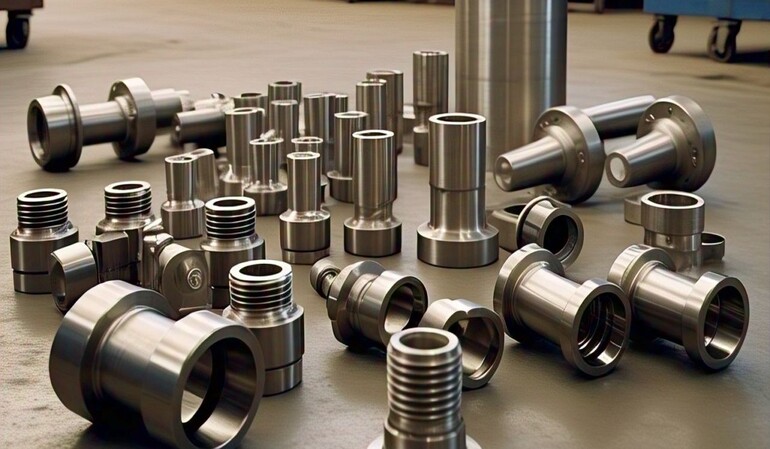- No.3, 327 S.V.P.Road, Makharai House, Mumbai- 400004, INDIA
- sales@ariesalloys.com
nickel alloy fittings
- Home
- nickel alloy fittings

Nickel Pipe Fittings: Strength, Composition, and Industrial Applications
Nickel pipe fittings are essential components in various industries due to their outstanding corrosion resistance, high-temperature stability, and mechanical strength. These fittings are widely used in chemical processing, marine, aerospace, and power generation industries, where extreme conditions demand superior material performance. Nickel alloys are particularly valued for their ability to withstand oxidation, acidic environments, and thermal stress, making them the preferred choice for high-performance applications.
Why Choose Nickel Pipe Fittings?
Nickel pipe fittings offer several key advantages:
- Exceptional Corrosion Resistance: Highly resistant to oxidation, acids, and harsh chemicals.
- High-Temperature Performance: Maintains strength and stability even in extreme heat.
- Mechanical Strength: Superior durability and resistance to deformation under pressure.
- Ductility and Machinability: Can be easily shaped, cut, and welded for custom applications.
- Longevity and Reliability: Ideal for demanding industrial environments requiring long-lasting performance.
Chemical Composition of Nickel Pipe Fittings
Nickel pipe fittings are available in various grades, each designed for specific industrial needs. Below are the compositions of common nickel-based alloys used in pipe fittings.
Nickel 200 & Nickel 201 (Commercially Pure Nickel)
Element |
Nickel 200 (%) |
Nickel 201 (%) |
Nickel (Ni) |
99.0 min |
99.0 min |
Iron (Fe) |
0.40 max |
0.40 max |
Carbon (C) |
0.15 max |
0.02 max |
Manganese (Mn) |
0.35 max |
0.35 max |
Silicon (Si) |
0.35 max |
0.35 max |
Sulfur (S) |
0.01 max |
0.01 max |
Copper (Cu) |
0.25 max |
0.25 max |
Nickel Alloys (Inconel & Monel Series)
Element |
Inconel 600 (%) |
Inconel 625 (%) |
Monel 400 (%) |
Nickel (Ni) |
72.0 min |
58.0 min |
63.0 min |
Chromium (Cr) |
14.0-17.0 |
20.0-23.0 |
- |
Iron (Fe) |
6.0-10.0 |
5.0 max |
2.5 max |
Molybdenum (Mo) |
- |
8.0-10.0 |
- |
Copper (Cu) |
- |
- |
28.0-34.0 |
Carbon (C) |
0.15 max |
0.10 max |
0.30 max |
Manganese (Mn) |
1.00 max |
0.50 max |
2.0 max |
Silicon (Si) |
0.50 max |
0.50 max |
0.50 max |
Mechanical Properties of Nickel Pipe Fittings
The mechanical properties of nickel pipe fittings vary depending on the grade and composition.
Nickel 200 & Nickel 201:
- Tensile Strength: 380-450 MPa
- Yield Strength: 100-150 MPa
- Elongation: 30-45%
- Hardness: 70-90 HRB
Inconel 600 & Inconel 625:
- Tensile Strength: 655-930 MPa
- Yield Strength: 310-585 MPa
- Elongation: 30-50%
- Hardness: 85-95 HRB
Monel 400:
- Tensile Strength: 480-620 MPa
- Yield Strength: 170-345 MPa
- Elongation: 30-40%
- Hardness: 65-85 HRB
Applications of Nickel Pipe Fittings
Nickel pipe fittings are widely used in a variety of industries, including:
- Chemical Processing: Pipes, reactors, and storage tanks handling corrosive substances.
- Aerospace: Jet engines, exhaust ducts, and heat exchangers.
- Marine & Offshore: Shipbuilding, underwater piping, and desalination plants.
- Power Generation: Nuclear, thermal, and renewable energy plants requiring high-temperature materials.
- Food & Beverage Industry: Processing equipment that must withstand acidic environments.
Conclusion
Nickel pipe fittings provide unmatched corrosion resistance, strength, and durability, making them a critical component in industries that demand long-lasting performance. With their superior chemical and mechanical properties, they ensure reliability in extreme environments. For premium-quality nickel pipe fittings tailored to your requirements, contact us today!
